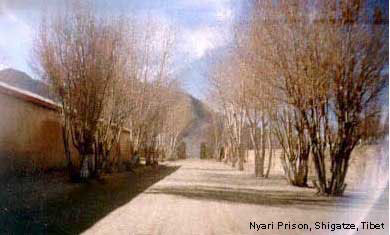
Initiated by President Jiang Zemin, China re-launched "Strike Hard" campaign to "curb rising criminal offenses," beginning April 01 for two years. The official statements justify the campaign as a "long-term endeavour to achieve the ultimate goal of improving China's public order situation in the future".
At a work meeting on social stability in Tibet, held in the first week of May 01, specific rules and regulations were issued to all levels of courts in the "Tibet Autonomous Region" to carry out the campaign further and more forcefully among the common populace. The minutes of the meeting, published in Tibet Daily on 8 May 01, stipulated that the "Strike Hard" scheme considers threat to the nation's stability, manslaughter, robbery, arms related crimes and theft as main offences.
It further proposes to crackdown heavily on drug trafficking, smuggling activities, mafiatic crimes, financial scams and guiding people illegally across foreign countries. Local Party Committees, under its supervision, are to strike relentlessly against activities that seriously threaten "social stability".
The May meeting imposed restraining order on guides who help refugees seek their freedom across the treacherous Himalayan Mountain. "This would seriously hamper not only the flow of refugees but also the wee bit of information on human rights abuses that they managed to share with the outside world. The restriction will gradually muffle the voice of the Tibetans inside Tibet from being heard," stated Mr. Lobsang Nyandak Zayul, the Executive Director of Tibetan Centre for Human Rights and Democracy.
The principal area of concern for the Tibetans originates essentially from the fact that the campaign takes a different form and focus in Tibet. For the Tibetans, the "Strike Hard" campaign has always had serious human rights implications. There have been numerous cases of arrests and detentions, torture and long-term imprisonment, for mere expression of support for Tibetan independence and the Dalai Lama which the authorities view as "endangering state security" affecting stability of the nation. Such incidences have more of a political connotation than that of a criminal angle thereby camouflaging the real intent of the campaign.
In China, the campaign focuses primarily on criminal activities of varying nature. Conversely, the need to safeguard stability and to oppose separatist activities is given topmost priority under the "strike hard" drive in Tibet. Hence, one campaign has twofold objectives, with one officially recognised throughout and the other targeting those who advocate Tibet's independence.
Similarly, the ongoing "patriotic education" in Tibet's religious institutions since 1996 demonstrates identical mission to suppress patriotic sentiments and outburst, and to mould the monastic community along the Party's communist line. The campaign, besides being a serious infringement on the rights of the Tibetan monks and nuns in terms of their belief, practice and allegiance, has resulted in many arrests and expulsions.
TCHRD records indicate the total expulsion of 12,271 clergy including 1,876 nuns in connection with the "patriotic education" campaign. In the year 00 alone, 862 expulsions reportedly took place in various monasteries and nunneries, of these 147 were nuns. Almost one-third of the current total of 451 political prisoners behind bars in Tibet are monks and nuns, and almost all these arrest have direct or indirect link to the so-called stability factor or independence related activism.
The first "Strike Hard" or anti-crime drive was launched in China in 1983, as a result of growing concern about a perceived rise in the then crime rates. Another "Strike Hard" drive launched in 1990-1 was designed to curb common crimes such as murder and robbery throughout China. Similar campaign launched officially in April 1996 was the most wide-ranging and the third of its kind.
Official Chinese media report series of implementation of the current "Strike Hard" campaign in Tibetan areas outside the "TAR". Tsongon Province (Ch: Qinghai) Police Department released reports of extensive examination in the region that resulted in mass arrests within weeks of the launch of new "strike hard" campaign. By 19 April 01, force of 9841 policemen and 383 PSB officers conducted investigation into a total of 5"8 rented houses, guestrooms, street shops, bars and barbershops in Tsongon area, and found 12,3462 lawbreakers, and arrested 494 criminals. In Golmud City, the law enforcing bodies busted six mafia groups, arrested several gang members and seized potentially dangerous weapons from them.